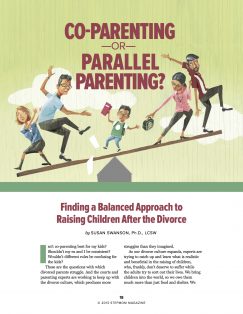
Is co-parenting after divorce really possible? The answer is: yes, no and maybe. Here’s some information to help explain:
Co-parenting, also known as cooperative parenting, is when both parents work together as a team to raise their children after the marriage or relationship has dissolved. Co-parenting helps children deal with the household changes by keeping their world consistent and reminding them that both parents are watching over them. It often takes time and practice, as well as a commitment by each of the adults, to keep the children out of the divorce. It means that communication is open between households so that both parents know what is happening in the other households. It also provides a structure for the children. Co-parenting after a divorce requires a lot of work and collaboration by the parents. These are skills that can be learned.
Conversely, parallel parenting is when there is little to no cooperation between the households. The term comes from child development literature. While some children interact and play together, research psychologists observed that children who do not have the skills to interact or engage with other children engage in a process of parallel play.
Susan Swanson, PhD, LCSW, Executive Director of The StepFamily Center in Beverly Hills, California believes that co-parenting after divorce and in remarried families is very challenging to many adults. She explains, “Few couples who remain hostile to one another or who try to actively undermine the other can co-parent in a way that makes it better for their children. This often leads to kids feeling caught in the middle and falling between the cracks of the broken relationship.”
In her article “Co-Parenting or Parallel Parenting?” inside the October 2013 back issue of StepMom Magazine Swanson specifies that, “When co-parenting is not possible, parallel parenting can be highly effective. What is most important is for children to be shielded from ongoing parental conflict and anger. When children are safe from conflict, they can more easily accept that things in mom’s house are one way and things in dad’s house are another way.”
Here’s what StepMom Magazine Publisher, Brenda Ockun, had to say about parallel parenting during her appearance on the Steve Harvey Show Stepmom Summit:
To learn more about co-parenting and raising healthy kids, subscribe to the monthly magazine.
